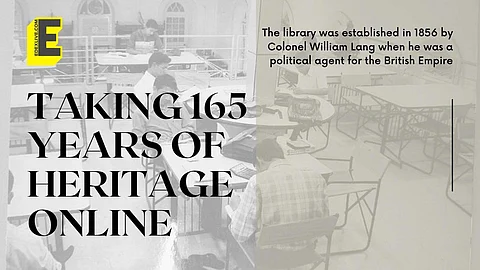

True heritage is often reflected in what we seek from the past and some libraries offer just that by simply being museums of the written world. One such kingdom of books is the Lang Library based in Rajkot, Gujarat. Kalpaben P Chauhan has been at the helm of the Lang Library for 24 years now. She talked to Edexlive and took this writer through the various stages the library has been through and how it has managed to carve a niche in the Saurashtra region.
"My initial posting was as a clerk-cum-accountant at the library. Initially, my skills in accounting and computers were enough to be proficient at the job but with time, I felt a curiosity towards Library Sciences. I wanted to know about the ways in which books are to be arranged, the different classification systems and how to increase reading awareness among people. So I pursued a Bachelor's degree in Library Sciences at Saurashtra University and master's at Samaldas Arts College in Bhavnagar. And now for the past 17 years, I have been the librarian at Lang Library," says Kalpaben, about how she was introduced to the library.
The library itself was established in 1856 by Colonel William Lang when he was a political agent for the British Empire in the Kathiawar region. "The library began as a small room in a school that was set aside by Lang himself for reading purposes. At that time, he was an advocate for girls' education as well," says Kalpaben, about the history of the library.
The library has aged really well through the years and is home to several old books. But the challenge had always been to keep them preserved for posterity. Until recently, they did not have a solution to the damaging of books due to atmospheric exposure. This all changed when digitisation came into the picture. "The pages would simply fall apart when handled. We were worried that future generations would be deprived of the opportunity to read these texts of historical relevance. Then we stumbled upon the digitisation technique idea. The trustees came together and we brainstormed the idea. When we put forward the plan to the government in 2017, we received a grant of Rs 10,00,000 for digitising the old books. We collaborated with an agency based in Ahmedabad for this process," explains Kalpaben.
The books that are among the oldest in the library include Gujarat Sarvsangrah, Saurashtra no Itihas (The History of Saurashtra), Kathiyawad Sarvsangrah, Rajkot Directory, Maharani Shree Victoria nu Jivancharitra (The Biography of Queen Victoria) and Kachchh Deshno Itihas (The History of Kachchh). "We have completed the scanning of over 12,000 books so far in the past four years. About 2,000 to 3,000 books are yet to be scanned which we will be doing by next year," says Kalpaben. Answering as to who benefits from these generations-old books, she says, "It is mostly researchers, especially in history and those who are writing history books that these centuries-old books come in handy."
The library, which has been visited by PM Narendra Modi and ex-Gujarat Chief Minister Anandiben Patel in the past, and withstood the 2001 Bhuj earthquake, requiring only minor renovations. The library is also known for housing old Parsi and Jain literature, which are very useful for researchers who study the culture pertaining to these communities. The books also offer answers to those who are preparing for competitive and civil service exams. Kalpaben says that the age group of 21 to 35 years is the demographic that is most frequently in touch with the library.
The library used to conduct several outreach programmes to stay in touch and relevant to society. "Until two years ago, we had about seven to eight book talks every year, which allowed people to understand the theme and main ideas of important books in just a matter of hours. It was beneficial for those who could not get time to read entire books. Besides that, we also had poetry recitals and discussions based on them, picnics for children, recipe and cookery competitions for cooks and other events that would get people to visit the library," explains Kalpaben.
Conveying the uncertainty in the times now, the veteran librarian says, "Earlier, people used to visit the libraries as a means to keep themselves informed and entertained. But today, of course, they have tools of the cyber world at their disposal. It is high time that libraries reach out to people instead of becoming obsolete. Ideally, we would like to conduct more programmes but the pandemic has put the brakes on them, at least for now."
